I’m Advocating for the Future of all our DREAMers
BY PAUL QUIÑONEZ | November 24, 2014
Imagine having to leave behind everyone you know and love to move to a foreign country, a country which you didn’t even fully comprehend existed, a country whose language you did not speak. This is precisely what happened to Gonzaga University freshman Brahiam Villanueva when he was six years old. But what led up to this event? What caused this to happen?
When Brahiam was five years old his dad immigrated to the United States to care for his recently widowed sister who was faced with the difficult situation of raising her kids alone in a foreign country, the United States. Brahiam, his mom, and his two siblings were left behind. For months, communication between Brahiam’s family and his father was nonexistent. Eventually, Brahiam’s mother decided to venture to the United States in search of her husband.
Once in the United States, Brahiam’s mother was reunited with his father and together they worked for four months to be able to bring Brahiam and his siblings to the U.S. Unknowingly, Brahiam embarked on a journey with his Grandma that would ultimately be the end of their relationship, a relationship that Brahiam holds close to his heart to this day. Without a choice, he was forced to begin his weeks-long journey from Mexico to Othello, Washington.
Instead of being overwhelmed with joy at being reunited with his parents in Othello, Brahiam recalls feeling a mixture of confusion and resentment. He remembers hardly recognizing his father, for he had changed significantly since he had left Mexico. But more important, Brahiam resented being forced to leave his grandma behind. When he realized that he would have to learn a new language and then serve as an interpreter for his family, Brahiam remembers facing the reality of having no parents to rely on for the first time. It was an overwhelming amount of change and responsibility for a six-year-old. Thankfully, Brahiam picked up the English language quickly.
About a year later, Brahiam and his family moved to Moses Lake to avoid tension between his mother and the aunt who had been housing Brahiam’s family until that point. This meant that they no longer had relatives nearby who could help them. Even more responsibility fell on Brahiam’s shoulders. It was around this time that in one of his drunken absences, Brahiam’s father went to jail for the first time. Brahiam’s mother was now the family’s sole provider and worked 18-hour days in the potato plantations nearby, just to get by.
“We never really saw her during this time. There were signs that she had been home, but we basically grew up alone after that,” says Villanueva.
Then, things took a turn for the worse when an illness made it impossible for Brahiam’s mother to continue working. “It’s unfortunate that death had to become a real possibility for my mom in order for us to be able to spend more time together,” says Villanueva. As a result of his mother’s illness, Brahiam was forced to begin working. During this time, Brahiam’s father returned home to help care for his shattered family.
Not surprisingly Brahiam’s grades reflected everything that was going on in his home. Yet, at the end of 8th grade he was invited by a middle school counselor to apply to AVID, a college readiness program. “I didn’t know what they saw in me. But, I saw AVID as a challenge and took it. In high school, my AVID teacher challenged me by enrolling me in AP and Honors classes. At the time, I didn’t know that I could just drop out of them. I thought that the counselors had all the control over my schedule. Since I have never liked to be treated as a child, I took the classes as another challenge and got mostly A’s and B’s,” says Villanueva.
Brahiam maintained good grades until the second semester of his junior year of high school, when his father once again left and Brahiam was expected to step up and provide for his family. Naturally, Brahiam’s grades dropped. But Brahiam’s teachers never gave up on him, and he was able to raise his GPA to a 3.9 for the year. Brahiam continued to do well in school and received a 4.0 during his senior year in high school.
“When my teacher realized that I had a 4.0 he asked me what college I was going to. That was when I realized that college is a thing and began to do research on it. Before, I had just assumed that I would never go to college since I am undocumented,” says Villanueva.
As it turns out, undocumented students are allowed to go on to higher education. Washington State even offers undocumented students in-state tuition and state financial aid (as of February 2014). So, Brahiam applied to Gonzaga University and received his acceptance letter in December. This did not mean that Brahiam could actually afford to attend Gonzaga University; after all, his immigration status made it impossible for him to qualify for need-based aid, and the merit aid he received was not enough. With the help of a senior student at Gonzaga, Brahiam was able to accrue about $7,000 more in private funding. This was still not enough, so the Gonzaga senior provided Brahiam with the opportunity to give a speech before members of Gonzaga’s administration and students to raise awareness about his fight toward obtaining a higher education.
The gamble was worth it, and a day after Brahiam’s speech his financial aid was increased, and he was awarded a full ride to Gonzaga University. Upon becoming a student at Gonzaga, Brahiam realized how truly blessed he was, and he would continue to be blessed with opportunities that before had seemed impossible. He was able to travel to Washington, D.C., to attend the Ignatian Family Teach-In for Justice and advocate for immigration reform.
When reflecting on his experience in Washington, D.C., Villanueva states that, “As I boarded my flight from Spokane to Washington, D.C., I looked out into the stars and realized that I have truly lived a good life. I couldn’t believe that I was being given the opportunity, and responsibility, of representing those who are marginalized in my community. Throughout the conference I felt a sense of belonging to something bigger than myself. Bigger than Gonzaga. I realized that I am not just a Zag. I am also a member of the Jesuit family and this family accepts and supports me as an undocumented student. The Ignatian family empowered me with its acceptance and I realized that all my struggles have been worth it.”
Once the conference was over, Brahiam got the opportunity to actively shape legislation that will affect his community through his meeting with Senator Cantwell’s office to discuss immigration reform. It wasn’t until he was in the senator’s office that the magnitude of what he was doing hit Brahiam. “It felt very unreal most of the time. I couldn’t grasp that this was happening. Me? Speaking to a Senator’s staff? I didn’t even know how to address the staffer. Was I the senator’s constituent, or not? Although I have grown up in Washington State, I am not a citizen. So I was unsure of how to refer to myself,” says Villanueva.
Now that he is back at Gonzaga, Brahiam is still in disbelief about everything he has been able to experience, and he believes that this will be the case for the rest of his life. Yet Brahiam hopes to use his privilege to help others and cannot wait to see what the future has in store for him. At the end of our meeting Villanueva left me with these words, “I’m not only advocating for myself and my community. I’m advocating for the future of all our DREAMers. For the future of those who will take my place at Gonzaga.”
Paul Quiñonez is a political science and economics double major at Gonzaga University. Originally from Minatitlan, Colima, Mexico Paul was raised in Pasco, Washington and has always been interested in advocating for and serving the immigrant community. Throughout his high school years Paul did so by volunteering as an interpreter at the Franklin County Courthouse during elections, using his bilingual skills in assisting AARP as an interpreter during tax season, and by being a teacher’s assistant in an ESL classroom at Stevens Middle School.
Upon entering college Paul continued his efforts by meeting with elected officials in Olympia, Washington to advocate for the REAL Hope Act, a recently passed bill which granted undocumented students in Washington State eligibility for state financial aid. Additionally, Paul spent a semester in DC as a Congressional Hispanic Caucus Institute intern in Senator Stabenow’s office to acquire a better knowledge of the legislative process and how he can best serve his community. While in DC, Paul continued his advocacy efforts and participated in a march from Georgetown University to the White House in support of immigration reform, amongst other things.
Following his experience in Washington, DC Paul was accepted to the DHS Summer Scholars Academy in El Paso, TX. Through this experience Paul was able to observe a community which is directly impacted by immigration (El Paso is a border city) and its surrounding issues. Thanks to being in a border city during the time of the unaccompanied minors border crisis, Paul was also able to visit immigration detention facilities and see for himself how the federal government was attempting to cope with the issue. Now that he is back at Gonzaga University, Paul hopes to continue his advocacy work and share the social justice movements taking place at GU as part of the Ignatian Solidarity Network Media Team.

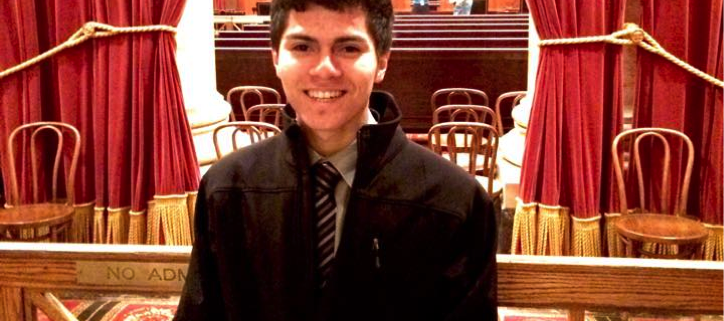
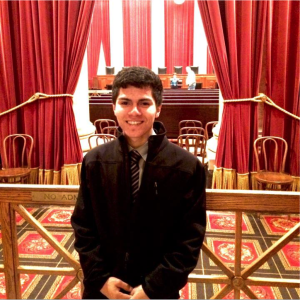
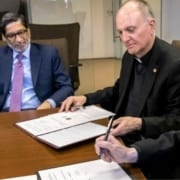

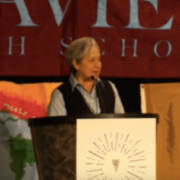
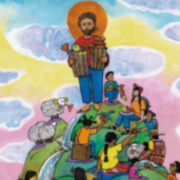
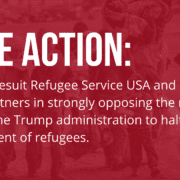



Leave a Reply
Want to join the discussion?Feel free to contribute!